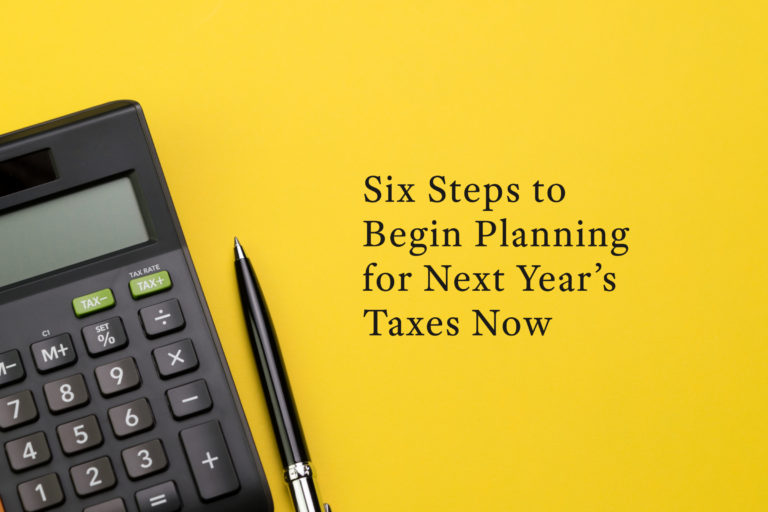These Tips Can Optimize Your Tax Planning Strategy
Everyone likes a surprise—except when it comes to their taxes. Taking a more thoughtful approach to planning next year’s taxes can help you get ahead and alleviate your tax burden. The further in advance you start planning for next year’s taxes, the more your financial future will thank you. Below are six tax planning tips to help you begin planning today.
Consider Hypotheticals
As Benjamin Franklin once wrote: “In the world, nothing is certain except death and taxes.” That said, even though taxes are sure to happen annually, they don’t always happen exactly the same way. Using a free online tax calculator tool can be helpful to give you a reference point for your current and future tax planning.
Make sure you don’t just speculate what’s most likely going to happen—it’s a valuable exercise to also run through a few hypothetical scenarios that can occur within reasonable income variables. How much do they affect your tax bottom line? What can you do today to help secure the most desirable outcome?
To Bunch or Not to Bunch?
A common tax planning strategy to consider is to bunch your deductions, which means combining them to pay more of one type of deductible in a given fiscal year in order to get the greatest tax benefit. Of course, this requires planning ahead.
There are certain rules and dependencies that are at play to regulate how and when you can bunch deductions. Here’s a good example of how it works. Say you’ve signed a contract with an orthodontist for your two youngest children’s braces. The orthodontist may offer you either a payment plan or a lump sum payment option. How do you know what to do?
If you can afford the upfront payment to align both those expenses into one year, you have a much better chance of reaching the threshold you need to in order to qualify for a deduction. Adults under 65 are only able to deduct medical expenses after they exceed 10%, so if you forgo the payment plan, you could be in a much better financial position come tax time.
How Does Income Factor In?
It may be impossible to predict some deductible expenditures—which can include property taxes, income tax, charitable contributions, and medical expenses—but if you can, you may have other opportunities if you align them with your anticipated income.
Say for example you have to make some major, expensive improvements to your office space. If it’s later in the year, say December, it may be tempting to make big purchases now before the close of the year. However, if this year’s income was leaner than you’d like and you anticipate making much more next year, you may want to reconsider your impulse buy. You could get a much higher benefit from the deduction if you purchase what you need just a few weeks later in January, assuming your increased income qualifies your business for a higher tax bracket in the new year.
What About Claiming Dependents?
If you have children who live with you full-time, you can claim them on your taxes as dependents. Just by having kids, you can have a profound impact on your tax return—the IRS allows you to take a $4,000 exemption for each dependent child. You can also further claim certain qualified expenses for your kids, including childcare costs, tuition payments, medical costs, and more.
The rules are a bit harder to decipher if you help support an adult parent, have dependents that aren’t your children who live with and rely on you, and if you share custody of a child with someone else. How much you spend to support your dependents and how many days they live with you per year will have a direct impact on your tax benefits.
Assess the Impact of Your Assets
Are you thinking about selling a major asset? You may be able to save big on your taxes. Say for example you’ve decided it’s time to sell your home. The market is good, and the value has increased even in the 18 months you’ve lived there.
You may be concerned about finding a buyer, but you should also reach out to a tax professional. If you have ownership of your home for just six more months, right up until the two-year mark, you could be eligible to exclude all of that profit from your taxes.
There are other timeframes for other assets. Note that for stocks and capital assets, you would likely want to keep them for at least a year. After that anniversary, you’ll pay much lower capital gains tax rates whenever you decide to sell.
Illuminated Advisors is the original creator of the content shared herein. I have been granted a license in perpetuity to publish this article on my website’s blog and share its contents on social media platforms. I have no right to distribute the articles, or any other content provided to me, or my Firm, by Illuminated Advisors in a printed or otherwise non-digital format. I am not permitted to use the content provided to me or my firm by Illuminated Advisors in videos, audio publications, or in books of any kind.










